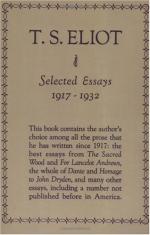|
This section contains 270 words (approx. 1 page at 400 words per page) |

|
Although Ezra Pound and a few other radicals were supportive from the start, critics tended to resent or ignore the early essays anthologized in Selected Essays, 1917-1932. Arthur Waugh's "The New Poetry" called his poems "un-metrical, incoherent banalities" with "no steady current of ideas behind them." Waugh represents a group of critics who did not take Eliot's literary theory seriously.
But, by the time Eliot published Selected Essays, 1917-1932 in 1932, he was already an extremely well-established critic. Some resented Eliot, as an American, telling the English what to think, and Delmore Schwartz points out in his essay "The Literary Dictatorship of T. S. Eliot" that many found Eliot far too overbearing and authoritative. All, however, found his thinking innovative and important. Richard Shusterman points out in his introduction to T. S. Eliot and the Philosophy of Criticism: "Whatever one thinks of the merit of Eliot's critical...
|
This section contains 270 words (approx. 1 page at 400 words per page) |

|




